Austrian GP: Hard racing or unfair? Max Verstappen highlights F1's dilemma
- Published
- comments
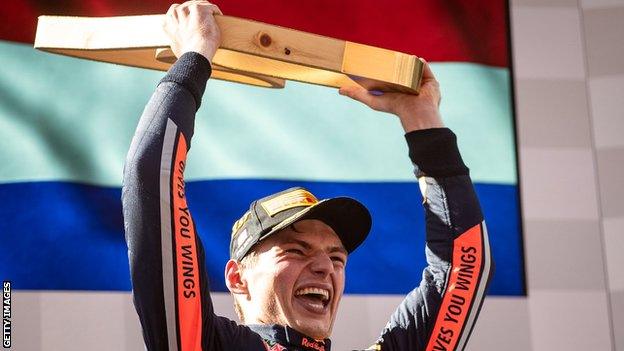
Red Bull's Verstappen celebrates his victory
For a sport that some have labelled as boring, there sure have been a lot of incidents, controversies and, yes, even some great racing in the first nine races of the 2019 Formula 1 season.
The Austrian Grand Prix provided the latest - a truly superb drive by Red Bull's Max Verstappen culminating in a controversial passing move for the lead on Ferrari's Charles Leclerc with two laps to go.
Was it "hard racing", as Verstappen said, or "not the way" to overtake, as Leclerc argued?
And so for the second time in three races, the victory depended on a decision in the stewards' room. Except at the Red Bull Ring the decision took rather longer than it did when Ferrari's Sebastian Vettel was deprived of victory with a five-second penalty for dangerous driving in Canada while the race was still running.
More than three hours after the end of the race, nearly two hours after the two drivers spoke to officials, it was decided that it was a "racing incident" because stewards "did not consider that either driver was wholly or predominantly to blame for the incident".
The delay between the race ending and the result being confirmed was criticised by some on social media - and created the opportunity for a swiftly discredited fake FIA statement, claiming Verstappen had lost his win, to be circulated among some in the media - but ultimately it is probably better to reach the right decision slowly than the wrong one quickly.
What happened?
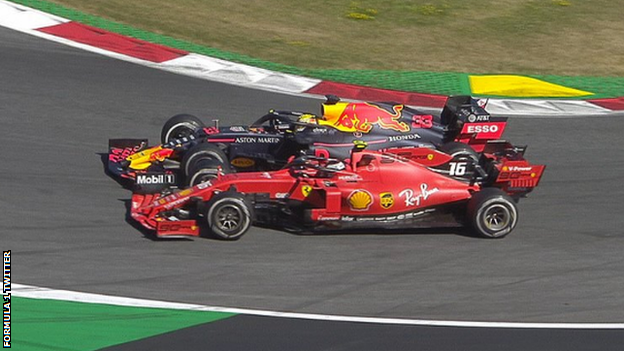
Verstappen described his move on Leclerc "hard racing"
Verstappen tried two moves on Leclerc. In the first, he got inside the Ferrari at Turn Three, but left him room to stay on the track on the outside. Leclerc was able to out-accelerate him on the run to Turn Four and keep the position.
On the next lap, Verstappen again got alongside - they were wheel to wheel at the apex, with Verstappen a few centimetres ahead - but this time he ran out to the edge of the track on the exit, and Leclerc was forced into the run-off area so had no chance to try to attack into Turn Four.
The point of contention was not over whether Verstappen ran Leclerc off the track in completing the move on lap 69 - which he clearly did - but whether that was legal or not.
It is the same rule of which Vettel fell foul in Montreal. But it was not the same sort of incident.
The agonising choice faced by the stewards was summed up by Mercedes F1 boss Toto Wolff.
"I wouldn't want be in the stewards' shoes," Wolff said. "As racers, we all like hard racing but you just need to define where the limit is. And this is where the regulations come into play again. Difficult one."
What is the problem?
The issue here is in chapter four of appendix L of the FIA sporting code. It states: "Manoeuvres liable to hinder other drivers, such as deliberate crowding of a car beyond the edge of the track or any other abnormal change of direction, are strictly prohibited."
And: "It is not permitted to drive any car unnecessarily slowly, erratically or in a manner deemed potentially dangerous to other drivers at any time."
The problem with that text is in its limitations, and its inability to contain the subtleties of the ethics of racing.
Is it 'hard racing' to force a driver wide and into the wall or off the track when he is fully alongside you - as Leclerc and Verstappen were - or partly, as in the case of Hamilton and Vettel? Or is that 'dirty driving'?
When are you required to give space and when are you not? When has a driver won a corner, and is therefore entitled to dictate his racing line, and when is the move effectively done and the driver being attacked has to cede position?
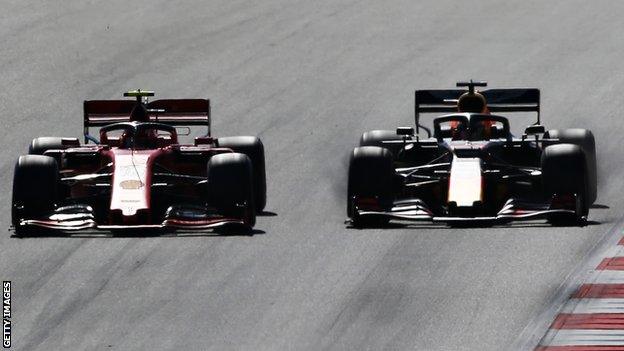
Leclerc had managed to defend his position before the Red Bull of Verstappen made the overtake at Turn 3
There are no hard and fast rules here, and everyone has a subtly different opinion of what is acceptable and what is beyond the pale.
Verstappen and Leclerc are old rivals from karting but it seems they have differing positions on on-track ethics themselves.
"It's hard racing otherwise we have to stay at home," Verstappen said. "If those things are not allowed in racing then what's the point of being in Formula 1?"
Leclerc responded: "It is just not the way you overtake."
Predictably, their team bosses also differed in their views.
Ferrari's Mattia Binotto said: "The rules for us are clear. There has been a collision and he has been forced off the track.
"There are rules, which we may appreciate or not and they have been applied in past races, but we respect the decision."
Binotto added that Ferrari would not be taking further action because it was time for the sport to move on.
Red Bull's Christian Horner said: "He had won the competition in the braking area. He was slightly ahead, he'd got to the apex first.
"At that point, he has won the corner. It is for the other guy to back out and try the undercut. It is slam dunk. Checkmate."
The future and the rules
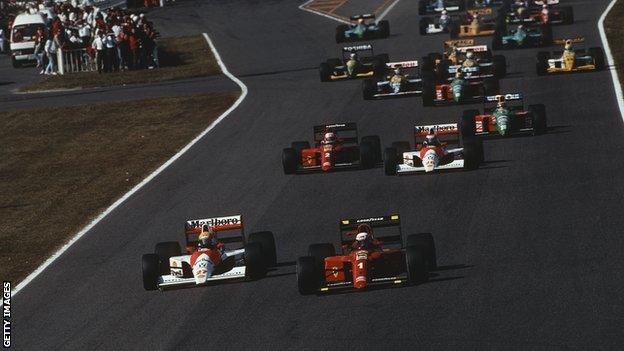
Ayrton Senna (left) pulls out from behind Alain Prost's Ferrari, seconds before they collided at the start of the 1990 Japanese Grand Prix. The three-time world champion later said of the incident: "If you no longer go for a gap you are no longer a racing driver"
Some argue that the drivers should be left to get on with it, and that sooner or later a code of ethics will emerge that defines what is acceptable and what is not.
But the problem with that is that it will always reward dirty driving. The rules, after all, were brought in because first Ayrton Senna and then, particularly, Michael Schumacher drove in a way that changed what "hard racing" was.
Schumacher literally drove into rivals, sometimes forcing them off the track, in an attempt to win - sometimes successfully, sometimes not. And the risk of death or injury that generally stopped drivers in the 1960s, '70s and '80s from driving in this way has largely been removed. Should that change what is accepted in terms of "racing"?
This topic has always been controversial, one that goes to the very heart of the essence of F1. After the Vettel/Hamilton incident, it has come front and centre, and now Verstappen/Leclerc will have only intensified the debate.
Here's two views from former drivers to be going on with.
Pedro de la Rosa,, external the former McLaren, Arrows, Jaguar and Sauber driver, said: "It was a superb race. Let's not forget though that the driver on the outside can and should back off at one point, but obviously with asphalt run offs no one does… hoping the guy inside gets penalised for forcing them off the track."
And Alexander Wurz,, external the Grand Prix Drivers' Association chairman, who is central to conversations on this topic with drivers and the FIA, added: "Investigation? Why are we investigating?"
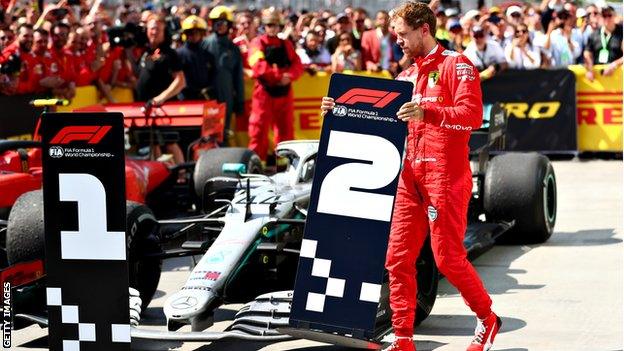
Vettel took the matters into his own hands and moved the number 1 sign back to his Ferrari at the Canadian Grand Prix earlier this month
There have been incidents that relate to this specific part of the rule book in the last three races in Canada, France and Austria, and yet the way they have been dealt with has differed.
In Canada, Vettel received a five-second penalty for forcing Hamilton off the track and to take evasive action to avoid a collision.
In France, Daniel Ricciardo was given two five-second penalties for passing Lando Norris and Kimi Raikkonen off the track, and no cars came into contact.
And in Austria, Verstappen forced Leclerc off the track and they banged wheels, but no further action was taken.
The incidents were all different, but not everyone will agree that the rules were applied in the same way in each - and it's clear that this topic of rules governing driver conduct and how they are applied is harming the sport's reputation.
One potential solution would be to appoint permanent stewards, rather than rotating them. It is something that has its drawbacks, but could be done easily, with a simple decision, requiring no rule change. It will be under serious consideration among F1's bosses in the coming days and weeks.
On Verstappen's win and Leclerc
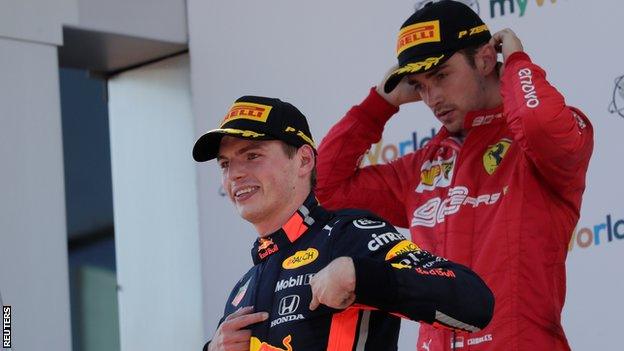
Verstappen's win at the Red Bull Ring is his sixth career victory
Any controversy over Verstappen's win should not detract from the sheer quality of his drive. He is making a speciality of outstanding victories, passing cars along the way, races apparently surrendering to his will, he and the car moving on to what looks like another level, implacable, immovable, irresistible. This was another.
There was great anticipation before the race at a Leclerc-Verstappen front row, arguably the two brightest young stars in F1 - both just 21 - going head-to-head for the first time, with the Mercedes right behind them.
But when he dropped back to seventh with a bad start, his race looked run. Damaging a tyre on the first lap only made things more difficult.
But Red Bull ran him as long as they dared in that first stint, and by the time he pitted on lap 31, he had a 10-lap tyre off-set on Leclerc, who was struggling with more tyre degradation than expected.
He bided his time for a while but into the last 20 laps he upped his pace and the win suddenly looked on. Verstappen did not need a second opportunity.
And so Leclerc was again denied a maiden win. Just like in Bahrain, he did nothing wrong. Back in the desert in March, it was an engine problem that denied him after a dominant drive. In Austria, an inspired drive from a rival who Leclerc knows well from their karting days together, when both marked themselves out as stars of the future.
But Leclerc's time will come. And with these two at the helm - and the likes of McLaren's Lando Norris and Williams' George Russell following on quickly - the future of F1 appears to be in good hands, whatever the rules on driver ethics.
What happened to Mercedes?
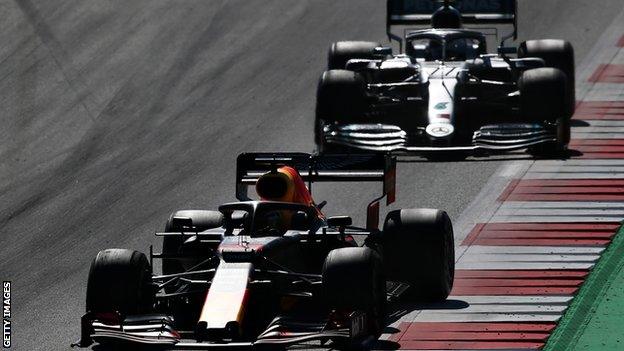
Catch a Mercedes if you can: Bottas didn't put up a fight when Verstappen closed in
It was a slightly surreal sight to see the Mercedes of Lewis Hamilton and Valtteri Bottas out of the picture.
Hamilton ran second to Leclerc in the closing laps but an attempt to run long like Verstappen was scuppered when he damaged his front wing running wide over kerbs - something he did several times. That required a nose change and with that, he was out of the picture.
Both he and Bottas, who finished third to trim Hamilton's championship lead to 31 points, were helpless because of cooling issues on their Mercedes, the combination of high track temperatures and nearly 700m of altitude taking the car out of its cooling window and requiring them to lift off as much as 400m before braking for the corners - so-called 'lift and coast'.
And so their run of eight consecutive wins comes to an end with a reminder that their domination has given a slightly unreal impression of the season.
Ferrari could and arguably should have had two or three wins by now - and now Red Bull have won one. That could be four out of the nine races won by cars other than Mercedes, and the season would look very different.
Of course, the Mercedes is still the best car and it remains pretty inconceivable that they and Hamilton will not ultimately walk away with another title double. But this was a reminder that it was perhaps never as easy as it looked.
After the race, Hamilton took the opportunity to address the coverage that had suggested F1 was boring in the face of his domination.
"You guys have been begging for racing and you got it today," he said. "Ultimately what today shows is you can't just look at one weekend and complain. Because that's what seems to happen.
"One weekend doesn't go so well and then everyone is like, 'The racing's boring.' And then you have a race like this and it's, 'Oh, it's exciting.' And then, 'Oh it's boring.'
"Make up your mind and just chill. Racing is racing."
